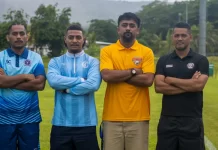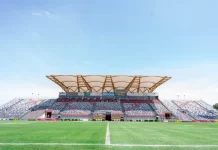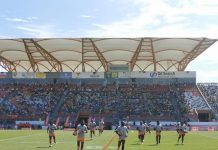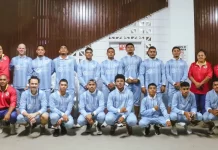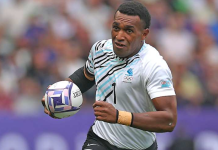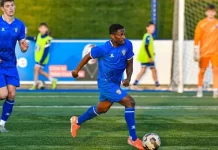A key focus for the 2023 FIFA Women’s World Cup Australia & Aotearoa New Zealand™ was creating a long-term legacy for both host nations, and also the wider region.
A tangible demonstration of the new-found significance for women’s football in Oceania has been on display over the past fortnight in Samoa.
For the first time eight nations lined-up for a stand-alone OFC Women’s Olympic Qualifying Tournament – a remarkable increase on the previous high of just three. The only time more than three nations participated was when the tournament doubled as the OFC Women’s Nations Cup.
There was also demonstrative growth on the field. New Zealand ultimately claimed the title with an emphatic 11-1 final victory over Solomon Islands, and with it passage to Paris 2024. One-sided results were a rarity and a host of nations achieved new highs in a senior OFC women’s competition.
Solomon Islands and Fiji edged long-term Pacific Games’ champions Papua New Guinea out of a semi-final berth, while Polynesian nations Tonga and Samoa also picked up victories, the latter reaching the semis themselves.
For those watching in the stadium or online, the sight of Rebekah Stott leading the Football Ferns out the tunnel on her 100th appearance, almost three years since being diagnosed with, and recovering from Hodgkin’s lymphoma, was a special moment.
Consolation for Solomon Islands should be reflected when the first FIFA/Coca-Cola Women’s World Ranking of 2024 is published on 15 March. Currently 109th, their run to the final, included a draw against 56th ranked Papua New Guinea and victory over 95th ranked Samoa.
FIFA’s provision of a range of on and off-field development activities in recent years has helped fast-track growth. From infrastructure upgrades – notably at the hosts’ Football Federation Samoa Football Stadium – to the provision of high performance coaches and a various financial packages supporting the national teams, the support has been broad and wide-ranging.
“We’ve seen so many shining examples of how the FIFA Women’s World Cup changed the lives of so many people in Australia and New Zealand, but it’s clear that the impact stretched far beyond the two hosts and into the wider Oceania region,” said FIFA Chief Women’s Football Officer and former Samoa international Dame Sarai Bareman.
“With this tournament being hosted in Samoa, I obviously have an even greater connection, but across the board it’s pleasing to see so many competitive matches and such a lift in the quality of football. It’s a testament to the hard work that is being done by OFC and its Member Associations.
“Major competitions play such a crucial role in the growth of women’s football. Last year we saw Papua New Guinea come so close to qualifying for the FIFA Women’s World Cup.”
The levelling of competition across the confederation reflects the commitment to improvement from both the world governing body and the respective Member Associations. FIFA has delivered 77 programmes to Oceanian nations since first launching the Women’s Development Programmes in the region.
Notably, FIFA launched a pilot programme to aid Pacific national teams prepare for the OFC Women’s Nation Cup 2022. This turned into a fully-fledged programme that supported a range of identified nations prepare for the 2023 FIFA Women’s World Cup. As at Australia & Aotearoa New Zealand 2023 where numerous nations achieved new highs, the material benefit of the programme has again been evident in Samoa this month.
Host nation Samoa is enjoying a significant period of growth. Experienced administrator Ronna Lee Galumalemana has this month been announced as the new CEO at Football Federation Samoa (FFS), one of the few women to lead a Member Association in the region.
FFS President Sam Petaia says FIFA has invested more than USD$5 million for infrastructure in the past few years. Such investment has allowed FFS to host several OFC tournaments over the coming year.
Apia Park will be the main FFS administrative headquarters, while the existing Tuanaimato facility will be developed into a High-Performance Centre. As part of FIFA 3.0 the Academy will be developed with a gym, training pitches and player accommodation, sport science and anti-doping being housed on the site.
“FIFA, through their infrastructure assistance, have given us a platform, that our Federation can challenge rugby,” said Petaia.
“It’s about giving opportunities to kids. [Football is] the most well-funded, and the most popular grassroots programme in the country. But when they transition from primary school to secondary school, that is when we tend to lose a lot of the football players to rugby.
“We have systems in place that we will make sure we try to hold onto our players, so they know there’s something for them when they leave primary school. So it’s about us building programmes we can sustain. In five to 10 years look out, that landscape can change.”
FFS Technical Director Ravinesh Kumar is adamant the success Australia & Aotearoa New Zealand 2023 has increased football interest across Samoa.
“I think the FIFA Women’s World Cup had a great impact on the young people, young girls as well,” he said.
“We had our holiday programs in December … and we could clearly see that there is a link, between the FIFA Women’s World Cup brought to Oceania and the interest it creates in our local kids. And now the Olympic qualifiers have backed up that that interest, in our girls especially. We could see a lot of girls have come in to watch the Olympic qualifiers,” he said.
SOURCE: OFC/PACNEWS







